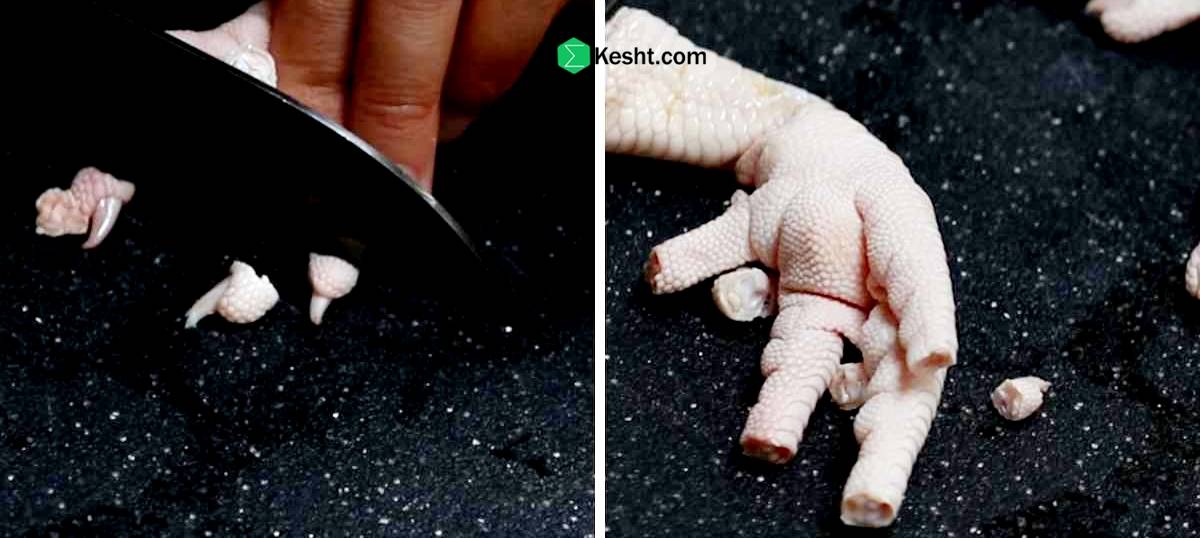Chicken Feet for Cats ?
Chicken feet can be a suitable and delicious food option for cats.
Below are the benefits and important points regarding chicken feet for cats:
Benefits of Chicken Feet for Cats: Source of Protein:
Chicken feet are a rich source of protein, essential for the growth and maintenance of muscles and tissues in cats.
Rich in Vitamins and Minerals:
They contain B vitamins (such as B6 and B12) and minerals like phosphorus and selenium, which contribute to the overall health of cats.
Skin and Coat Health:
The protein and healthy fats found in chicken feet can help improve the skin's health and enhance the shine of a cat's fur.
Easy to Digest:
Chicken feet are generally easy to digest and can serve as a tasty treat for cats.
Important Points:
Cooking and Preparation:
Chicken feet should be fully cooked, and harmful spices (such as salt and onion) should be avoided. Skin and bones should also be removed.
Dietary Variety:
Chicken feet should be used as part of a diverse and balanced diet, not as the sole food source for cats.
Veterinary Consultation:
If your cat has specific issues or follows a special diet, be sure to consult with a veterinarian.
Monitoring Reactions:
After giving chicken feet, observe your cat's reactions, and discontinue feeding if any problems arise.
Can Raw Chicken Feet Be Given to Cats?
Giving raw chicken feet to cats is a controversial topic. Below are important points regarding this matter:
Advantages and Disadvantages of Raw Chicken Feet:
Advantages:
Nutrient-Rich:
Some proponents of a raw diet believe that the nutrients in raw meat are better preserved.
Wild Nature:
Cats are natural hunters, and consuming raw meat may align more closely with their natural instincts.
Disadvantages:
Bacterial Risks:
Raw chicken feet may contain bacteria such as Salmonella or E. coli, which can be dangerous for both cats and humans.
Nutritional Imbalance:
A raw diet may not fully meet a cat's nutritional needs. Cats require specific nutrients that must be carefully considered in their diet.
Risk of Digestive Issues:
Some cats may be sensitive to raw meat, which can lead to digestive problems.
Important Points:
Veterinary Consultation:
Before adding raw chicken feet or any type of food to your cat's diet, be sure to consult with a veterinarian.
Cooking Chicken:
If you are concerned about the risks associated with raw meat, it is better to cook the chicken feet thoroughly and avoid harmful spices.
What Bacteria in Raw Chicken Feet May Be Dangerous for Cats?
Raw chicken feet may contain several types of bacteria that can be harmful to both cats and humans. Below are some of these bacteria:
Salmonella:
This bacterium can cause gastrointestinal infections, leading to symptoms such as diarrhea, fever, and vomiting.
E. coli:
Certain strains of this bacterium can cause severe gastrointestinal infections and produce symptoms similar to those of Salmonella.
Campylobacter:
This bacterium can also lead to gastrointestinal infections, with symptoms including abdominal pain and diarrhea.
Listeria:
Although less common, this bacterium can cause infections that are dangerous for both cats and humans.
Staphylococcus:
Under certain conditions, this bacterium can cause skin or gastrointestinal infections.
Important Points:
Proper Cooking:
Cooking chicken feet thoroughly can help eliminate these bacteria.
Hygiene:
Maintaining hygiene during the preparation and storage of raw foods is crucial.
What Treatment Options Exist for These Bacterial Infections in Cats?
The treatment of bacterial infections in cats depends on the type of bacteria and the severity of the infection. Below are some common treatment methods:
Antibiotics:
The veterinarian may prescribe appropriate antibiotics to treat bacterial infections. The choice of antibiotic depends on the type of bacteria and the overall condition of the cat.
Fluids and Hydration:
In cases where the cat is experiencing severe diarrhea or vomiting, providing fluids and proper hydration is crucial. There may be a need for fluids and electrolytes to compensate for dehydration.
Anti-inflammatory Medications:
In some cases, anti-inflammatory medications may be prescribed to reduce inflammation and improve symptoms.
Appropriate Diet:
Providing a digestible and nutritious diet can help improve the cat's condition. Sometimes, dietary changes may be necessary.
Hospitalization:
In severe cases, hospitalization may be required for better monitoring and treatment.
Prevention:
The best way to prevent bacterial infections is to maintain hygiene in feeding and avoid raw or contaminated foods.
Important Points:
Veterinary Consultation:
Always consult a veterinarian if you suspect an infection to ensure appropriate and timely treatment.
What Are the Symptoms of Bacterial Infections in Cats?
The symptoms of bacterial infections in cats can vary and depend on the type of bacteria and the severity of the infection. Below are some common symptoms:
Gastrointestinal Issues:
Diarrhea: The cat may experience diarrhea, which can be bloody or watery.
Vomiting: Frequent vomiting can be a sign of infection.
Abdominal Pain: The cat may be sensitive to touch on its abdomen and show signs of discomfort.
Fever:
An elevated temperature can indicate an infection. The cat may become lethargic and less active.
Loss of Appetite:
Cats may refuse to eat due to feeling unwell.
Respiratory Symptoms:
In some cases, bacterial infections can lead to respiratory issues, coughing, or sneezing.
Fatigue and Lethargy:
Cats may sleep more than usual and withdraw from their daily activities.
Inflammation and Redness:
If there is an infection in a specific area, the skin in that area may become inflamed and red.
Behavioral Changes:
Unusual behaviors such as aggression or hiding from others can indicate discomfort.
Urinary Problems:
In cases of bacterial infections in the urinary system, symptoms may include bloody urine or difficulty urinating.
Important Points:
Veterinary Consultation:
If you observe any of these symptoms, it is essential to consult a veterinarian promptly for appropriate diagnosis and treatment.




